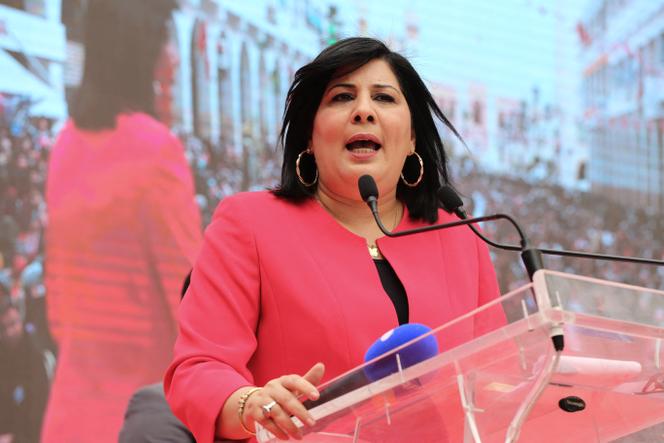


Abir Moussi had previously been spared, despite her scathing criticism of Tunisian President Kais Saied. She has now, however, ended up in prison, just like around 20 other opposition figures in Tunisia. On Thursday, October 5, after 48 hours in police custody, the investigating judge decided to place her in pre-trial detention.
Abir Moussi, a lawyer and leader of the Parti Destourien Libre (PDL) party, was arrested on Tuesday, October 3, near the Carthage presidential palace. The PDL is an anti-Islamist group that includes supporters of the former regime of Zine El-Abidine Ben Ali, as well as those nostalgic for the father of Tunisian independence, Habib Bourguiba. Moussi was arrested as she attempted to lodge an appeal against the local elections scheduled for December. Sje is charged with "an attack aimed at changing the form of government, inciting people to arm themselves against each other or to provoke disorder, murder or pillage in the country," under article 72 of the Tunisian Penal Code. She faces the death penalty.
The same article has been used against several opponents still in prison, such as Rached Ghannouchi, leader of the Islamo-conservative Ennahda party. "Pro-regime Facebook pages relayed the decision even before the judge issued the committal order. As far as I'm concerned, there's no doubt that this decision was made in advance," lawyer Nafaa Laribi told Le Monde. His client, he says, reacted with "great courage and humility, despite some health concerns linked to the conditions of her detention."
Moussi, a bold and somewhat provocative 48-year-old legal scholar, was the Assistant Secretary General in charge of Women's Affairs at the Rassemblement Constitutionnel Démocratique (RCD), Ben Ali's former party. She made a name for herself with her dramatic methods. After her election to the Assembly of the People's Representatives in 2019, she would turn up wearing a bulletproof vest or helmet. The Assembly was also the site of numerous Moussi-instigated sit-ins, diatribes and altercations with other MPs.
A fierce opponent of the Islamists, she succeeded in attracting the support of disappointed members of Nidaa Tounes, the secularist party of former president Beji Caid Essebsi, after the latter allied himself with Ennahda in 2014. She is a tireless orator, and her speeches and rallies often resemble a "one-woman show," with long, fast-paced monologues punctuated by anecdotes and jibes.
Through her methods, Moussi has contributed to weakening the Islamists, already undermined by unstable government majorities and the health and economic effects of the Covid-19 pandemic. "She has played the card of denigrating democracy and its institutions by turning Parliament into a free-for-all," said Hamza Meddeb, a researcher at the Carnegie Middle East Center.
Impotent in the face of incessant obstruction of the Assembly, then chaired by Ghannouchi, Ennahda had called on President Saied in July 2020 to bring in the Presidential Guard to restore order. To no avail. The scenes of verbal and physical violence thereafter served as an argument for the Tunisian president to resort to a state of emergency and suspend the Assembly's session on July 25, 2021.
In the aftermath of this power grab, Moussi said that she did not want to upset "popular joy," and took advantage of the occasion to call for the dismantling of the "Brotherist octopus" – a reference to the Muslim Brotherhood – which had allegedly infiltrated the country's institutions since the revolution.
But just as her party was riding high at the top of the polls in 2021, buoyed by its fight against Ennahda – which it advocates for banning – Moussi was quickly destabilized by Saied's policies. Part of the opposition has accused her of being an objective ally to the president. She has shared his aversion to Islamists and to the post-2011 democratic transition process.
With her authoritarian rhetoric, sovereignist leanings, declared preference for a presidential regime and conservative positions on male-female equality in inheritance and on homosexuality, her stances are remarkably similar to those of the Tunisian president.
But "in the end, it's Kais Saied who has reaped the rewards of the war of attrition she waged since 2019, aggregating several types of anti-corruption, anti-Islamist voters," said Hamza Meddeb, who pointed out, however, that "if this situation lasts, he may come out the loser, because a good proportion of Abir Moussi's supporters will say to themselves: 'He's lumping us together with the Islamists.'"
Before her imprisonment, Moussi had criticized the president for governing "alone and as he pleases." In a bid to distance herself from his policies, she had tried to raise various issues and offer alternatives for dealing with the economic crisis. She accused Saied of being a "usurper" in the fight against the Islamists, and of wanting to dismantle the state built by Bourguiba.
Dipping in public opinion, Moussi is back in the headlines since her arrest and has acquired a new status, that of a victim of the Tunisian government's repression. Just like her long-standing adversaries, the Ennahda Islamists.
Translation of an original article published in French on lemonde.fr; the publisher may only be liable for the French version.
